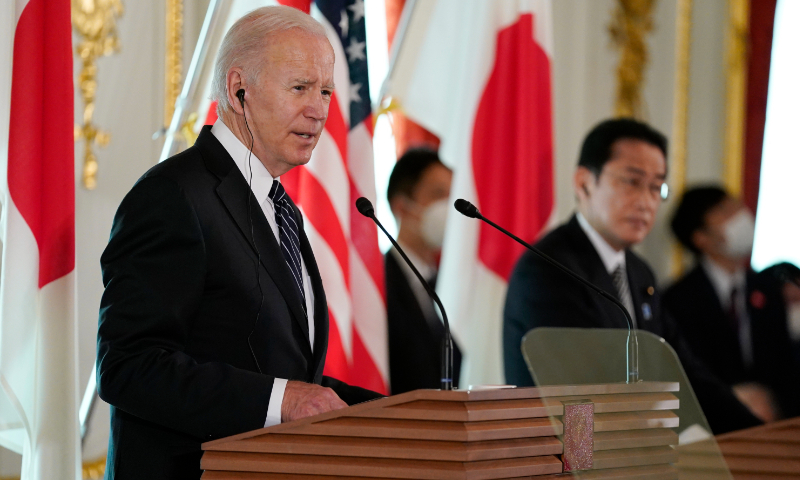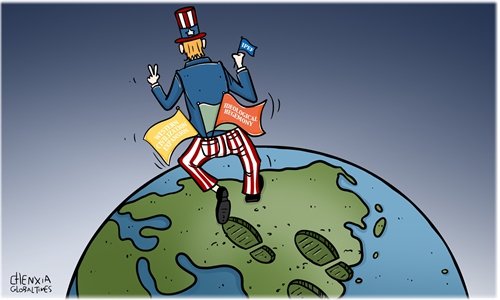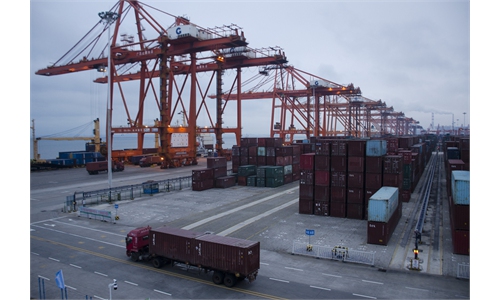Japan PM to meet Asia-Pacific leaders, but efforts to promote IPEF will fail: analysts

US President Joe Biden speaks during a news conference with Japanese Prime Minister Fumio Kishida at Akasaka Palace on May 23, 2022, in Tokyo. Photo: VCG
Right after seeing off US President Joe Biden who was visiting Tokyo for the second in-person Quad summit in Tokyo, Japanese Prime Minister Fumio Kishida prepared to meet a different group of leaders including Singapore Prime Minister Lee Hsien Loong and Malaysia Prime Minister Sabri Yaakob.
The leaders are gathering for the 27th International Conference on the Future of Asia, better known as the Nikkei Forum. It will be themed "Redefining Asia's role in a divided world" this year and will run from Thursday to Friday in Tokyo. Also present will be Thai Prime Minister Prayuth Chan-o-cha and Cambodia Prime Minister Hun Sen, as well as other leaders and senior government officials from the Asia-Pacific region.
Held by Nikkei annually since 1995, it is considered to be one of the most important conferences in Asia, in which political, economic and academic leaders offer their opinions on regional issues and the role of Asia in the world.
It comes just after the summit of the four-nation Quad leaders, and Chinese analysts reached by the Global Times on Wednesday viewed the back-to-back diplomatic events in Tokyo as a continuation of Kishida's lobbying effort to attract players in the region to join the US-led economic bloc called the Indo-Pacific Economic Framework (IPEF). A few of the Nikkei Forum attendees have signed up, but most have chosen not to.
The IPEF has 13 inaugural members including the Quad countries - the US, Japan, Australia and India - and US allies in the region such as South Korea, as well as a few members of the Association of Southeast Asian Nations (ASEAN) such as Singapore, Malaysia and Brunei.
According to the Center for Strategic and International Studies, a think tank based in Washington, most Southeast Asian countries are worried about the optics of China being excluded from the IPEF, and the politicized nature of the framework that could force an unwelcome choice between Washington and Beijing. There are also concerns about the IPEF's unclear form and structure.
"It would be not surprising for Kishida to bring up the topic of the IPEF or to try to lobby the conference attendees at the Nikkei Forum. But he should understand that Southeast Asian countries like Cambodia who have close ties with China would respond indifferently," Gu Xiaosong, dean of the ASEAN Research Institute at Hainan Tropical Ocean University, told the Global Times on Tuesday.
Zhao Gancheng, a research fellow at the Shanghai Institute for International Studies, pointed out that India is the only IPEF signatory from the Indian Ocean region so far, meaning that the IPEF doesn't really qualify for its official name.
Chen Xiangmiao, an assistant research fellow at the National Institute for South China Sea Studies, told the Global Times on Wednesday that the US might have asked Japan to use the forum to fix the awkward situation for the IPEF.
Trying to persuade South Asian countries such as Sri Lanka, Bangladesh and more ASEAN members to join the IPEF might be a task high on the agenda for Kishida, but the outlook does not look very promising, analysts said.
Chen also warned that the IPEF standards in terms of supply chain, labor welfare and environmental protection are overly high and incompatible for developing countries in the region. Therefore, joining the IPEF would lead to chaos in the market, and even divergence within the ASEAN bloc. "Therefore, countries in the region may maintain their reservations about joining."
Singaporean leader Lee Hsien Loong noted ahead of the Nikkei Forum during an interview with the Nikkei that China's development is positive for the region, but countries in the Asia-Pacific also want to maintain their very important ties with other economies like Japan as well as the US and Europe.
Lee is bringing a number of high-ranking Singaporean officials such as Foreign Minister Vivian Balakrishnan for the visit to Tokyo. Malasyia's Prime Minister Sabri Yaakob will be accompanied by his Minister of Foreign Affairs Saifuddin Abdullahand and Senior Minister of International Trade and Industry YB Mohamed Azmin Ali.
Judging from the line-up of the visiting groups, Gu noted that attendees might prefer negotiating bilateral topics such as economic development and mutually beneficial areas such as investment and trade, rather than playing political games or provoking China.
Chinese analysts also predicted that Kishida would take the opportunity to lobby the ASEAN member states as well as leaders in the Asia-Pacific Region to express condemnation for Russia. However, that would also be rejected by the visiting leaders, as such a Cold War mentality would not help with regional development.




